 |
|
|
| Date |
Information |
|
| 05/12/2021 |
Lieutenant Alfred Rose-Cleland is commemorated locally on Moy War Memorial and on Dungannon War Memorial. |
| 05/12/2021 |
Family: Henry Somerville Leopold Rose-Cleland, Elizabeth Anne Rose-Cleland, Alfred Middleton Blackwood Bingham Rose-Cleland (born 12th May 1895). |
| 05/12/2021 |
Alfred Rose-Cleland was born in the Dungannon area on 12th May 1895. |
| 05/12/2021 |
Alfred Middleton Blackwood Bingham Rose-Cleland was the only child of Henry Somerville Rose- Cleland and Elizabeth Anne Rose-Cleland (nee Middleton). |
| 05/12/2021 |
Lieutenant Alfred Rose-Cleland is also commemorated on the war memorial at Columba’s College, Rathfarnham, Dublin. |
| 02/06/2020 |
02666 |
| 01/08/2018 |
Mr Alfred M Rose-Cleland, son of Mr Henry S Rose-Cleland, of Bedford House, Moy has received a commission in the 4th Battalion, Royal Dublin Fusiliers. He was educated at the Royal School, Dungannon, and at St Columba’s College, Rathfarnham, County Dublin. At the commencement of the war Lieutenant Cleland, who was in the employment of the well-known firm of McLaughlin and Harvey, contractors and builders, Belfast, was working at Rocking, near Braintree in Essex, but came home and enlisted in the Tyrone (Service) Battalion of the Royal Inniskilling Fusiliers. He served some months at Finner Camp, and was a lance corporal when gazetted as second lieutenant. Lieutenant Cleland comes of a fighting Scottish race of great antiquity. Their coat of arms, tradition states, was acquired by their being hereditary fortesters to the ancient Earls of Douglas. One of his ancestors, James Cleland, was cousin of the famous Sir William Wallace, the hero of Scotland, and fought by his side in most of his exploits against the English, and particularly in the celebrated sea fight when Thomas de Longville, commonly called the Red Rover, was taken prisoner. Indeed, Blind Harry, in his history of Wallace, refers to him as Wallace’s cousin, and says that he ‘bade with hym in mony perelowes place.’ His grandson, Alexander Cleland, fought at Flodden Field in defence of James IV, of Scotland, and there is a charter extant, dated 1449, to which is appended his seal on which the family coat of arms, a hare with a hunting horn about its neck, appears. Another ancestor, William Cleland, defeated Claverhouse at Drumclog, and was afterwards Lieutenant Colonel of the First Regiment of the Cameronians, which was embodied in support of the Covenant. He fell while leading his regiment at Drumkeld. The Irish branch of the family settled in Bangor, County Down in the year 1645, and produced many notable public men. Lieutenant Cleland’s great grandfather, who had an adventurous career both on sea and land, was killed at the early age of 28 years while leading his company at the storming of Attor in India in June 1768. Lieutenant Cleland’s grandfather, the late Mr James Downett Rose-Cleland, of Rath Gael House, Bangor, County Down, was a celebrated public man, having been a magistrate and deputy lieutenant for the county. He commanded the Newtownards Yeoman Infantry at the Battle of Saintfield on 9th June 1798, and in the August following, raised the Rath Gael Yeoman Infantry, receiving repeated thanks from the government for his services. While filling the office of High Sheriff for County Down in 1805, he presided at the historic election for that county between Robert Stewart, Viscount Castlereagh (who brought about the union between Great Britain and Ireland) and Colonel John Meade, which lasted twenty one days. The election had been caused by Lord Castlereagh being appointed Secretary of State for the Colonies and War Department in Mr Pitt’s government, but principally through the Downshire family influence, Lord Castlereagh most unexpectedly found himself at the bottom of the poll, and had to return to London and accept a seat for one of the ‘pocket boroughs’ of the government. The result of the poll created a profound sensation throughout the three kingdoms, and dealt a vital blow to Mr Pitt’s prestige. Mr James Cleland was a descendant of the Berkshire family of Rose, and took the additional surname Cleland under the will of his distant relative Patrick Cleland, of Ballymagee, Bangor. He was born on 24th March 1767, and lived to a very ripe old age. His eldest son died on 20th November 1794, an infant, and his 9th son is the present genial Mr H S Rose-Cleland, of Bedford House, Moy. the latter often surprises new acquaintances by informing them that his eldest brother died 121 years ago, and that his father was born 148 years ago. |
| 01/08/2018 |
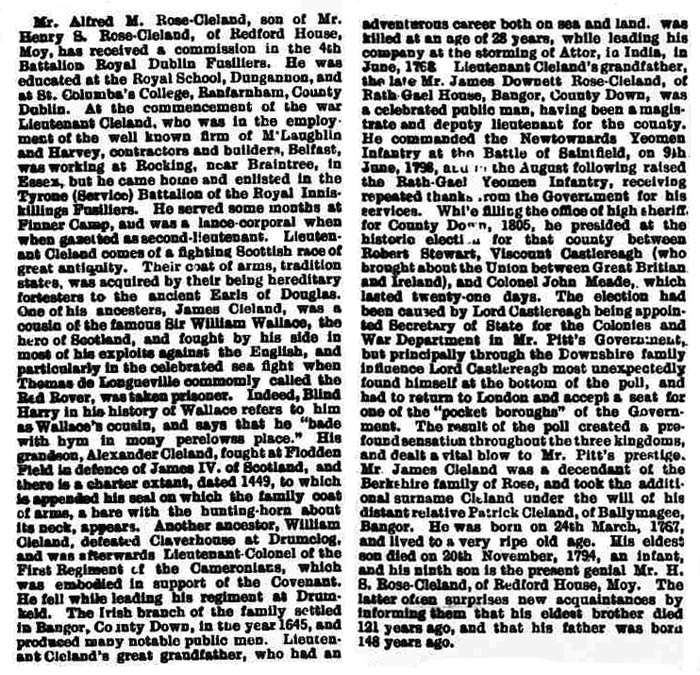 |
| 01/08/2018 |
From the Mid Ulster Mail dated 20th March 1915: |
| 23/07/2018 |
From the Mid Ulster Mail dated 27th February 1915: |
| 23/07/2018 |
Mr Alfred M Rose-Cleland, son of Mr Henry S Rose-Cleland, of Bedford House, Moy has received a commission in the 4th Battalion, Royal Dublin Fusiliers. He was educated at the Royal School, Dungannon, and at St Columba’s College, Rathfarnham, County Dublin. At the commencement of the war Lieutenant Cleland, who was in the employment of the well-known firm of McLaughlin and Harvey, contractors and builders, Belfast, was working at Rocking, near Braintree in Essex, but came home and enlisted in the Tyrone (Service) Battalion of the Royal Inniskilling Fusiliers. He served some months at Finner Camp, and was a lance corporal when gazetted as second lieutenant. Lieutenant Cleland comes of a fighting Scottish race of great antiquity as Burke’s ‘Commoners’ records. One of his ancestors, James Cleland, was cousin of the famous Sir William Wallace, the hero of Scotland, and fought by his side in most of his exploits against the English, and particularly in the celebrated sea fight when Thomas de Longville, commonly called the Red Rover, was taken prisoner. Another ancestor, William Cleland, defeated Claverhouse at Drumclog, and was afterwards Lieutenant Colonel of the First Regiment of the Cameronians, which was embodied in support of the Covenant. He fell while leading his regiment at Drumkeld. The Irish branch of the family settled in Bangor, County Down in the year 1645, and produced many notable public men. Lieutenant Cleland’s great grandfather, who had an adventurous career both on sea and land, was killed at the early age of 28 years while leading his company at the storming of Attor in India in June 1768. Lieutenant Cleland’s grandfather, the late Mr James Dowsett Rose-Cleland, of Rath Gael House, Bangor, County Down, was a celebrated public man, having been a magistrate and deputy lieutenant for the county. He commanded the Newtownards Yeoman Infantry at the Battle of Saintfield on 9th June 1798, and in the August following, raised the Rath Gael Yeoman Infantry, receiving repeated thanks from the government for his services. While filling the office of high sheriff for County Down in 1805, he presided at the historic election for that county between Robert Stewart, Viscount Castlereagh (who brought about the union between Great Britain and Ireland) and Colonel John Meade, which lasted twenty one days. |
| 23/07/2018 |
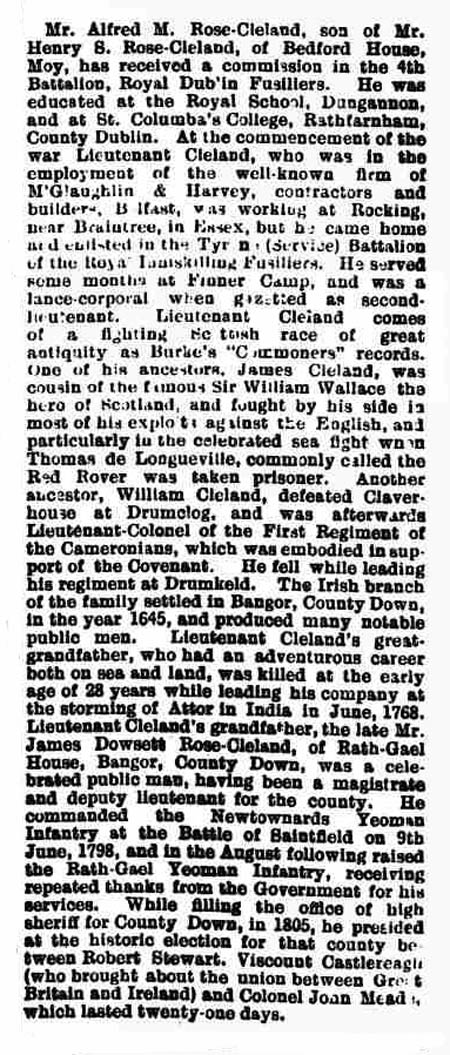 |
| 30/12/2015 |
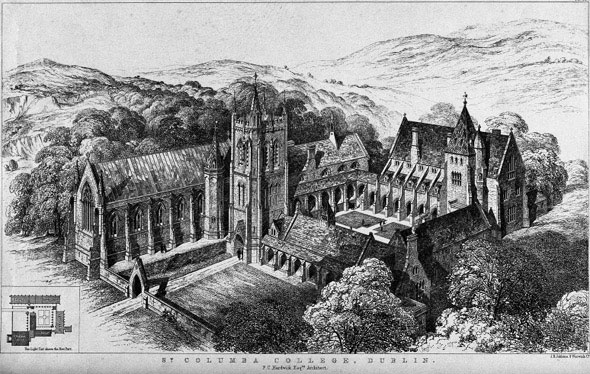 |
| 30/12/2015 |
The CWGC records Lieutenant Alfred Middleton Blackwood Rose-Cleland as the son of Henry S Rose Cleland and Elizabeth A Rose-Cleland of Redford House, Moy, County Tyrone, Ireland |
| 30/12/2015 |
In his will, the Administration of the Estate of Alfred Middleton Rose-Cleland late of Redford Moy County Tyrone Lieutenant Royal Dublin Fusiliers who died 1 July 1916 in France granted at Armagh to Henry S. Rose-Cleland Gentleman. |
| 30/12/2015 |
In a newspaper biography, Lieutenant Rose-Cleland was described as "the lineal descendant of a Scottish noble family of great antiquity, one of his ancestors being a cousin of the famous Sir William Wallace, the hero of Scotland, while another fought at Flodden Field in defence of James IV of Scotland". |
| 30/12/2015 |
Lieutenant Rose-Cleland is buried in Auchonvillers Military Cemetery in France. His inscription reads: ‘CALLED AND CHOSEN AND FAITHFUL’ REV.XVII. 14 |
| 30/12/2015 |
Lieutenant Alfred Middleton Blackwood Rose-Cleland was killed in action on the first day of the Battle of the Somme on 1st July 1916, age 21. |
| 30/12/2015 |
Alfred then became Lieutenant in the Royal Dublin Fusiliers. The London Gazette of 7th April 1916 notes that the “under mentioned Second Lieutenants (on probation) are confirmed in their rank: INFANTRY. The Royal Dublin Fusiliers. Alfred Middleton Blackwood Bingham Rose-Cleland.” |
| 30/12/2015 |
Alfred returned home to enlist in the 9th Royal Inniskilling Fusiliers. He served some months at Finner Camp, and was a Lance-Corporal when gazetted as 2nd Lieutenant in February 1915. |
| 30/12/2015 |
Alfred Rose-Cleland was working for the building firm of McLaughlin and Harvey on a contract in Rocking, Essex, England, when the war started. |
| 30/12/2015 |
Alfred then went to Columba’s College, Rathfarnham, Dublin. |
| 30/12/2015 |
The 1911 census shows Alfred as 15 and living at Altnavannog, Bernagh, Tyrone. He is still at school. Alfred's father was now a linen manufacturer. |
| 30/12/2015 |
Alfred was educated initially at Dungannon Royal School, entering in 1906. |
| 30/12/2015 |
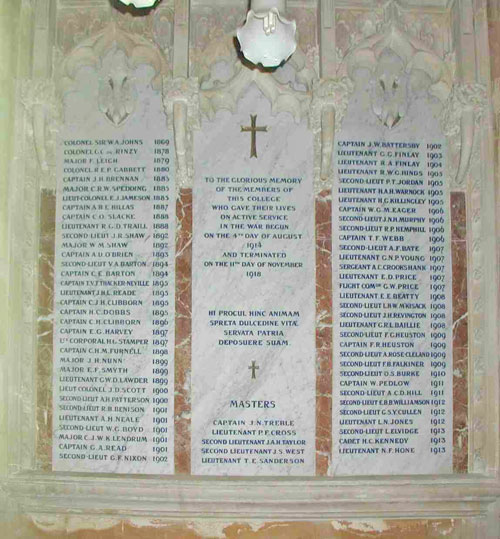 |
| 30/12/2015 |
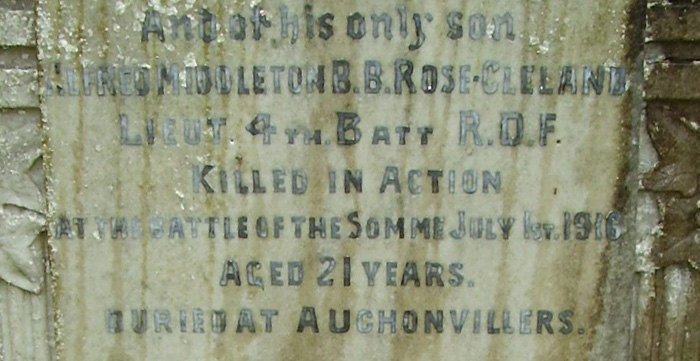 |
| 30/12/2015 |
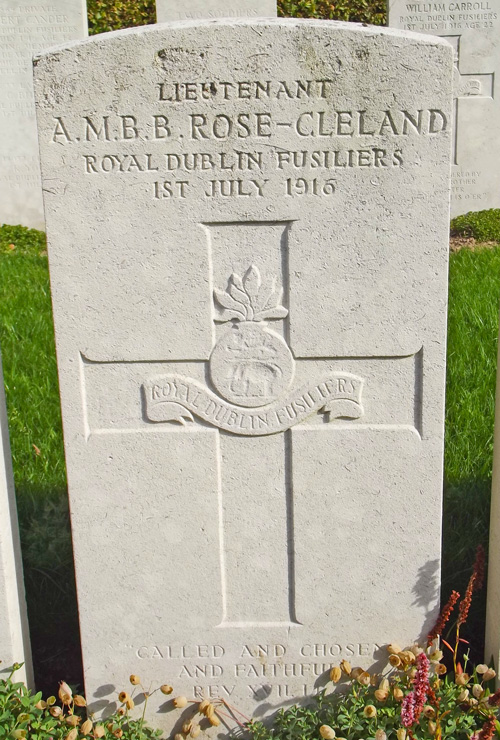 |
| 30/12/2015 |
The 1901 census records Alfred as 6 years old. Alfred's father was a linen merchant. They lived at Altnavannog, Bernagh, Tyrone. |
| 30/12/2015 |
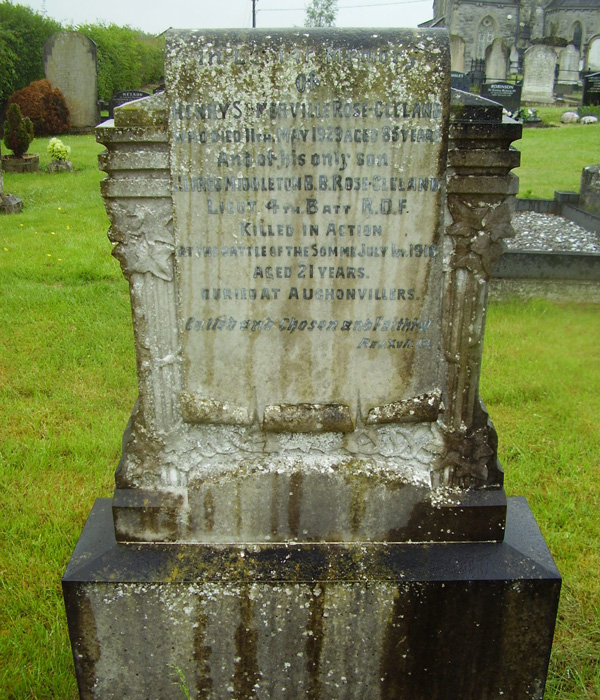 |
| 30/12/2015 |
Mr Henry S Rose-Cleland, Redford House, Moy, was notified by the War Office on Saturday evening that his only child, Second Lieutenant Alfred M Rose Cleland, Royal Dublin Fusiliers, had been killed in action on 1st July. The deceased officer was educated at Dungannon Royal School and at St Columba's College, Rathfarnham. At the commencement of the war, Lieutenant Cleland, who was in the employment of Messrs McLaughlin and Harvey, contractors and builders, Belfast, was working at Rocking, near Braintree, Essex, but he came home and enlisted in the 9th Inniskillings (Tyrone Volunteers). He served some months at Finner Camp and was a lance corporal when gazetted as second lieutenant in February 1915. He was the lineal descendent of a Scottish noble family of great antiquity, one of his ancestors being cousin of the famous Sir William Wallace, the hero of Bannockburn, while another fought in Flodden Field in defence of James IV, of Scotland. A more immediate ancestor, while filling the office of High Sherriff of County Down in 1805, presided at the historic election between Lord Castlereagh (who brought about the Legislative Union) and Colonel Meade, which lasted twenty one days. |
| 30/12/2015 |
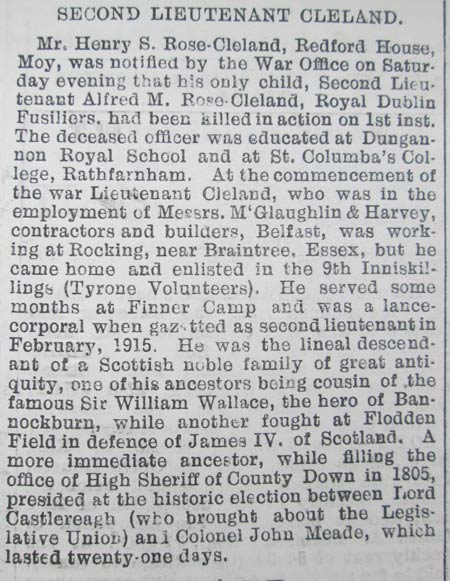 |
| 30/12/2015 |
From the Mid Ulster Mail dated Saturday 15th July 1916: Second Lieutenant Cleland |
| 30/12/2015 |
ROSE-CLELAND – Killed in action, 1st July, second Lieutenant Alfred M B Rose Cleland, Royal Dublin Fusiliers, only son of Henry S Rose-Cleland, Redford House, Moy, aged 21 years. |
| 30/12/2015 |
 |
| 30/12/2015 |
From the Mid Ulster Mail dated Saturday 15th July 1916: |
| 30/12/2015 |
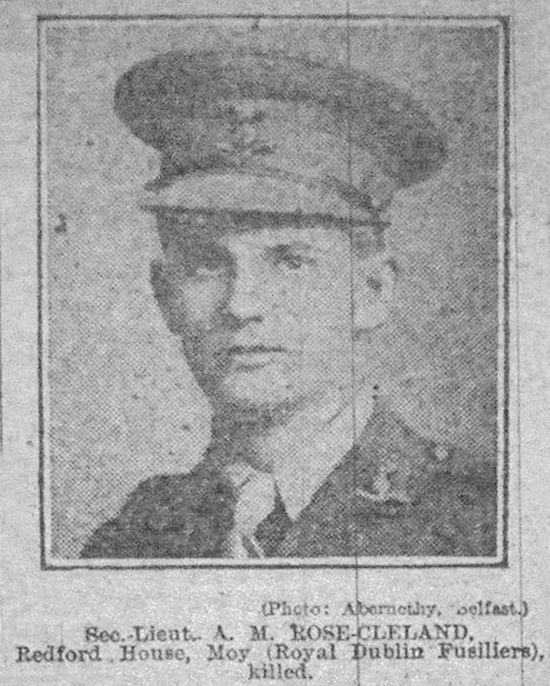 |
| 30/12/2015 |
Lieutenant Rose-Cleland is also remembered in Moy Church Of Ireland churchyard on the family headstone. |
| 30/12/2015 |
 |
| 30/12/2015 |
Mr Henry S Rose-Cleland, Redford House, Moy, was notified by the War Office on Saturday evening (7th July) that his only child, Sec Lieut Alfred M Rose-Cleland, Dublin Fusiliers, had been killed in action on 1st July. The deceased officer was educated at Dungannon Royal School and at St Columba's College, Rathfarnham. At the commencement of the present war Sec-Lieut. Cleland, who was in the employment of McLaughlin and Harvey, Belfast, was working at Rocking, Essex, but came home and enlisted in the 9th Inniskilling Fusiliers. He served some months at Finner Camp, and was a Lance-Corporal when gazetted as 2nd Lieutenant in February 1915. He was the lineal descendent of a Scottish noble family of great antiquity, one of his ancestors being cousin of the famous Sir William Wallace, the hero of Scotland, while another fought at Flodden Field in defence of James IV, of Scotland. |
| 30/12/2015 |
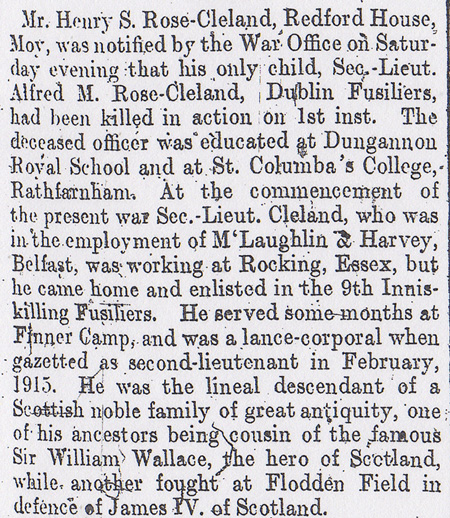 |
| 30/12/2015 |
From the Tyrone Courier dated 13 July 1916: |
| 30/12/2015 |
Mr. Alfred M. Rose-Cleland, son of Mr. Henry S Rose-Cleland, Bedford House, Moy has received a commission in the 4th Battalion Royal Dublin Fusiliers." |
| 30/12/2015 |
 |
| 30/12/2015 |
From the Tyrone Courier of 4th March 1915: |
| 30/12/2015 |
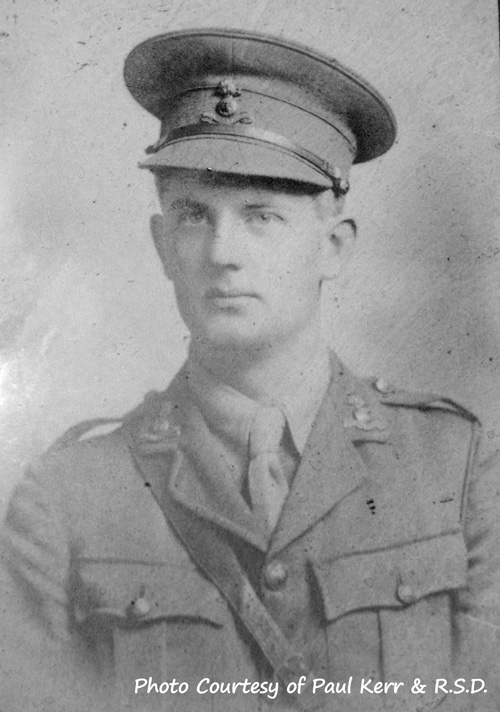 |

|
|